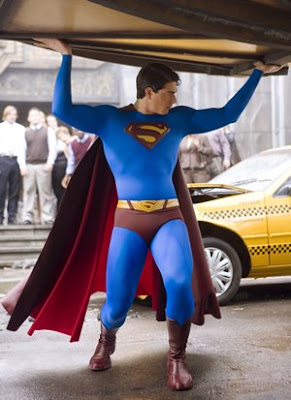In 2012 the economy is shot, the prisons are overcrowded, fires burn randomly in major cities, and thje only colors in existence seem to be dark blue, grey, and black. Death Race has all of the visual markers of classic dystopian fare with the grim color schemes, constantly overcast skies, and settings in scenes of urban decay. However, unlike most classic dystopian films such as Brazil, Metropolis, The Handmaid's Tale, The Condemned, The Omega Man, Wall-E, 1984, and so forth, Death Race apparently has nothing to say about society. It is definitely a child of Corman in that the appeal of this movie lies in the violence, the cars, and the babe.

Death Race is the story of Jensen Ames (Jason Statham), an ex-NASCAR racer who lost his license do to some shady dealings. He has a country music type day...the plant where he works shuts down, he gets home to find his wife murdered and himself framed for it. Sentenced to prison for life he is sent to Terminal Island, home of the Death Race.
There he is under the direction of Warden Hennessy (Joan Allen), the by-the-numbers corporate villain who is willing to kill prisoners for good television ratings to make money for her corporation. I suppose that could be the message of the movie if not for the fact the entire line-up of prisoners involved in the Death Races seem to indeed be exactly what you would expect in a maximum security prison for the violent criminal. They are unabashed and unashamed psychopathic killers who race because they like killing people. They do not feel taken advantage of but actually enjoy what they do.
Ames is expected to take the place of secretly deceased masked racer Frankenstein. If he wins the next race Frankenstein will be a 5 time winner and therefore entitled to freedom. However, it is quickly obvious that Hennessy has no intention of allowing her highest ratings earner, Frankenstein, to win a race.

She has even gone so far as to co-opt Frankenstein's navigator Case (Natalie Martinez). Case is a fine example of the exploitation nature. There is no real reason within the Death Race world to have a female navigator brought in. However, in the film-going world, Natalie Martinez is really easy on the eyes in her tight jeans, mid-riff baring and bust enhancing t-shirt so she comes along for the ride.

Ames is driving the real star of Death Race, the fast-back armored Mustang.
As the race goes along, he and rival Machine Gun Joe (Tyrese Gibson) kill most of the competitors who are there for cannon fodder with the notable exception of the prisoner who actually killed Jensen's wife who of course must be killed by Ames. The other drivers knock off a couple of each other, and the bizarre addition of the monstrous Guard-driven semi accounts for a couple more. This forces Machine Gun Joe and Ames to team up to eliminate it.

In the end Machine Gun Joe, Case and Ames team up to escape the prison, kill Hennessy and escape to a good life in Mexico.
There are no themes of redemption, though there certainly are themes of vengeance. The movie is not complicated and makes no bones about what it is; a big engine, big gun ride full of big guns, death and destruction with a feel-good ending. If you like that, you should really like Death Race. It doesn't do very much but it is very good at what it does.














































